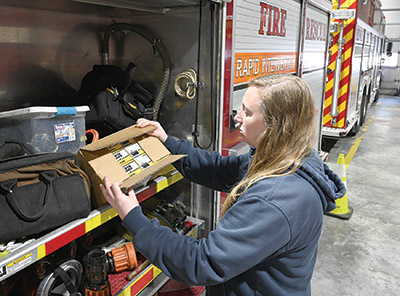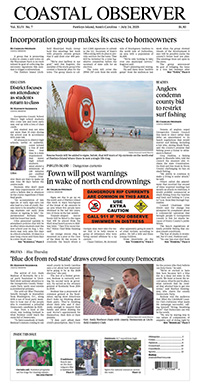Safety
Midway firefighters make smoke detectors part of their routine

Bill Collins was at a brush fire on Waverly Road recently. But his work didn’t end when the fire was out. He was headed back this week to install smoke detectors for the homeowner.
Midway Fire Rescue, where Collins is the fire marshal, has installed 1,100 detectors this year through a federal grant. That represents about 400 homes.
“I’m beyond ecstatic,” Collins said, who is trying to find out if it represents a record. “I don’t know of anybody that’s done that.”
Midway has given out smoke detectors as part of fire safety programs for decades, initially through the Red Cross.
“The Red Cross would give us 50 or 100 smoke alarms,” Collins said.
The program ramped up under his predecessor, Mark Nugent. He applied for grant funding from the Federal Emergency Management Agency. The first year, Midway got funds for about 1,000 detectors.
“We would do community blitzes,” Collins said, going door to door and offering to install the units where needed. “We were putting them up left and right.”
Smoke detectors are now common, and he estimates there are few homes in the Midway service area that don’t have them. The question that’s now being asked is, do those detectors work?
By law, homes now require hard-wired smoke detectors. The units communicate so that an alarm activated in one part of a house sounds on units in other areas.
What Midway staff discovered was that the old, hard-wired units were failing. They didn’t want to replace them with stand-alone units.
So the latest grant funded around 1,500 hard-wired and 1,000 stand-alone units.
“Where it really took off this year was the Tradition homeowners association annual meeting,” Collins said, adding that the program was announced as a smoke detector giveaway. “Our phones just blew up.”
Other homeowners groups learned of the project.
In addition, Midway crews will now ask about smoke detectors when they respond to residential calls, if the circumstances allow. There are smoke detectors on all the vehicles and tools to install them.
“We ask, while we’re here, can we check your smoke alarms?” Collins said. “We don’t leave a property unless there are two working smoke alarms.”
That conversation leads to others. They talk about exit plans, home safety assessments and the Vial of Life program for medical information.
“We have some great conversations,” Collins said.
The useful life of a smoke detector is 10 years. As most people discover at some point – often in the middle of the night – they have an alarm that sounds when their battery runs down. Midway used to promote changing the batteries twice a year when the time changed in the spring and fall. Now it promotes testing the devices twice a year.
“The only way to know is to push that little button,” Collins said.
Midway also gives away quarter-inch diameter dowels to facilitate testing.
Collins doesn’t always need to go that far.
“I see some that are literally museum pieces,” he said.
One visual cue is that the once white plastic has turned to a deep shade of ivory.
“The response I get is, ‘I’ve never had a problem with it,’ ” Collins said. “Of course not.”
After each installation, the homeowners get a lesson in how the systems work and how to test them.
The installations have dropped off with the holidays. Earlier this year, the pace was so brisk that Collins worried there would not be enough smoke detectors for those who need them.
The goal of the federal program is to provide them for people who can’t afford them. So Midway started qualifying the need.
One of the first homes where Collins did an installation was in a golf course community. The owner, who was 96, needed five or six units.
“It’s just not in my budget,” the man told him.
The man got the help he needed.
Midway will install detectors provided by the homeowner. Because of liability concerns, staff can only replace existing hard-wired units. “We’re not certified electricians,” Collins said, so they won’t upgrade old stand-alone systems.
FEMA’s next grant cycle begins in the new year. Collins plans to seek funds to continue the smoke detector program. He also wants to get money to buy devices that alert people with hearing loss when the alarms go off by shaking their bed. Those cost $300 each and would likely require a doctor’s letter like a similar state program.
“I want to expand our capability,” Collins said.
Midway could also use a staff member to manage the program, but the grants only fund a portion of salaries and only for a limited time, he said.
Along with the safety aspects, the program has other benefits for Midway.
“It gets us out in the community. It lets us meet people,” Collins said.




